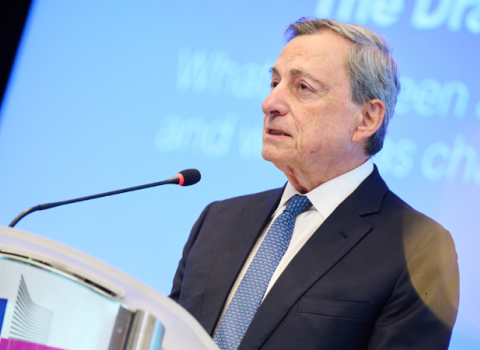EU research directorate chief says Commission-wide discussions on the successor to Horizon Europe will begin ‘in earnest very soon’. Outputs from this ‘brainstorming’ will be handed to an expert group later this year, he tells Science|Business

Marc Lemaître, director-general in the European Commission's directorate-general for research and innovation
Marc Lemaître, recently installed as head of the EU research directorate, is ready to lead the charge as the European Commission starts laying the foundations for the next Framework research programme.
In an interview with Science|Business Lemaître promised the process “will start in earnest very soon.”
The Luxembourger took up office in February, following a seven-year stint as the head of the Commission’s directorate responsible for Cohesion policy. He stepped in at a pivotal moment for EU research policy, with the €95.5 billion Horizon Europe approaching key milestones. In the coming months, Lemaître will guide the mid-term evaluation of Horizon Europe, due in the first half of 2024, and also oversee the evaluation of the predecessor programme Horizon 2020, expected in December.
Results of both of these evaluations will feed into the work on the next seven-year framework programme, FP10.
Lemaître said internal talks are ongoing between staffers at the research directorate and the executive agencies that are responsible for implementing Horizon Europe. Following on from this, they will consult other Commission services on the shape of the next research programme.
“This brainstorming phase is the segment to gather themes and thoughts to then nourish the reflection process, which will take place in a high-level expert group,” said Lemaître. The expert group – many call it the new Lamy group, after Pascal Lamy who chaired the group that advised the Commission on Horizon Europe – is expected to be set up by November this year.
Extending the consultation process beyond the research directorate is a nod to the increased importance of FP10 as a vehicle for delivering on the EU’s green and digital priorities. Policymakers have set ambitious goals for transforming the European economy, and now look to researchers and innovators to develop the technology and solutions for getting there.
“I deeply believe that research and innovation is absolutely indispensable to fulfil the collective ambitions that we have as European Union. To put it in more romantic terms, R&I is indispensable to make the future that we want possible,” said Lemaître.
But Europe is losing steam in the global tech race, he admits. More investment is needed to catch up with global leaders, such as the US, and to increase the societal impact of R&I. This means aligning future research programmes with EU policies, as has been done in Horizon Europe.
“I think that we should look honestly and critically at our performance,” says Lemaître. “And here, I believe, we need to reflect - given our clear objectives - on how to give intelligently perhaps additional sense of direction to the research efforts at European level.”
He noted that the Commission is going to propose an intermediary 2040 objective for the EU’s 2050 climate transition, which will help set clearer goals for green innovation. “By then we will have a pretty clear transition path for carbon neutrality,” Lemaître said.
Research performance
One key aspect of laying the foundations for future research policy will be determining what is working and what is not in Horizon Europe.
Lemaître said the Commission needs to take a good look at to what extent outputs of Horizon Europe research are translated through to market. “I don’t think I’m too harsh when I say we have a mixed track record here and we need to seek some more systematic pick up of research results,” he says. “We need to reflect how we can do that better.”
There will be a fine balancing act here, with Lemaître also pledging support for basic research and saying the focus on policy-driven research won’t affect the balance of fundamental and applied research in the EU programmes, as he highlighted the track record of the European Research Council (ERC).
EU’s long-term goals, Lemaître notes, depend on allowing scientists to explore uncharted territory. “In my opinion, it is part of the winning formula to have an ERC with sufficient means to give that space for free research, free in the sense of freedom to choose your topic.”
Room for improvement
Some parts of FP10 may need a little revamp or further support. Widening, the Horizon Europe programme that seeks to give a step-up for countries which need help with improving their R&I performance – mostly concentrated in central and eastern Europe – is one element Lemaître hopes to improve. But it’s not just about Widening, he notes. There is a need to reconsider how EU research policy can help member states improve their overall performance.
“We have a good starting point as a policy framework, but we need probably to find more impactful ways to improve that capacity across member states,” he said. “I think we should have an honest look at [the] Widening instruments, as they are designed today and as they have been designed since 2014, and ask ourselves whether we have the right or sufficient toolbox to make real structural difference there.”
Another way to strengthen EU research is to continue fostering cooperation beyond the bloc. Despite a slow start to Horizon Europe’s much-anticipated international expansion, Lemaître says the “as open as possible, as closed as necessary” formula continues to be relevant.
Association is intrinsically good for Europe, he said, and the EU has the tools to allow it to put limits on collaboration if it poses threat to security.
On Sunday, New Zealand became the first country outside Europe’s immediate neighbourhood to sign off an association deal, with Canada, Japan and South Korea looking to follow in the footsteps. But two and a half years into the programme, progress has been far from rapid, as even the EU’s closest neighbours the UK and Switzerland continue to be locked out of the programme.
“The value of Horizon Europe increases, think, exponentially with the number of significant research players that are associated to it,” said Lemaître. “There is no need to have second thoughts or qualms about the association agenda.”
Firmly on track
When asked about the performance of the European Innovation Council (EIC), which has been plagued by problem after problem, from funding for start-ups arriving months after it was promised, to the abrupt suspension of the EIC submissions platform last month, Lemaître insisted it is “firmly on track”.
Last month, the Commission proposed topping up the EIC Accelerator programme with an extra €2.1 billion. In May, the Commission moved the strategic management of the fund from the executive agency, EISMEA, back under its own wing. This was done “to smoothly bring back these responsibilities from the agency and to ensure business continuity,” explained Lemaître.
More change to come
Lemaître’s appointment in February led on to further changes at the research directorate. Most notably, in May research and education commissioner Mariya Gabriel resigned to form a new government coalition in her home country of Bulgaria.
Bulgaria has now nominated a new commissioner to take over Gabriel’s portfolio in the College of Commissioners – Iliana Ivanova, currently a member of the European Court of Auditors and former MEP and vice chair of the European Parliament budgetary control committee.
Before she takes office, Ivanova’s nomination must be accepted by the European Parliament and the member states. Lemaître hopes this process won’t take too long and Ivanova can start as early as September. But things aren’t standing still. “We have started to prepare very actively to support her through this process,” he stressed.
In the absence of a dedicated commissioner, vice presidents Margrethe Vestager and Margaritis Schinas have taken on parts of Gabriel’s portfolio. That meant there is no leadership void, Lemaître said, pointing to recent proposals on the Strategic Technologies for Europe Platform (STEP), which includes extra €2.1 billion for the EIC, and to the economic security strategy.
But this isn’t the end of the changes in the research directorate with the headcount of 950 due to be cut by 75 over the next three years, as part of a Commission-wide effort to slim down operations. These staff cuts are a continuation of plans set in motion a few years ago, when the Commission decided to keep RTD focused on R&I policy and the design of the Horizon programme, and move the implementation of research grants to executive agencies.
Lemaître noted this will not be the first time he’s been assigned the job of slimming down a Commission service. But he insists it’s a challenge to be embraced and a fresh chance to improve the directorate. He informed some of the staff about his plans, which he hopes to accomplish by 1 November, in a meeting last week.
“We will now turn to the implications for each and every individual staff [member], turn to the details of possible shifts of responsibilities between different entities, specifically different units,” said Lemaître.





 A unique international forum for public research organisations and companies to connect their external engagement with strategic interests around their R&D system.
A unique international forum for public research organisations and companies to connect their external engagement with strategic interests around their R&D system.